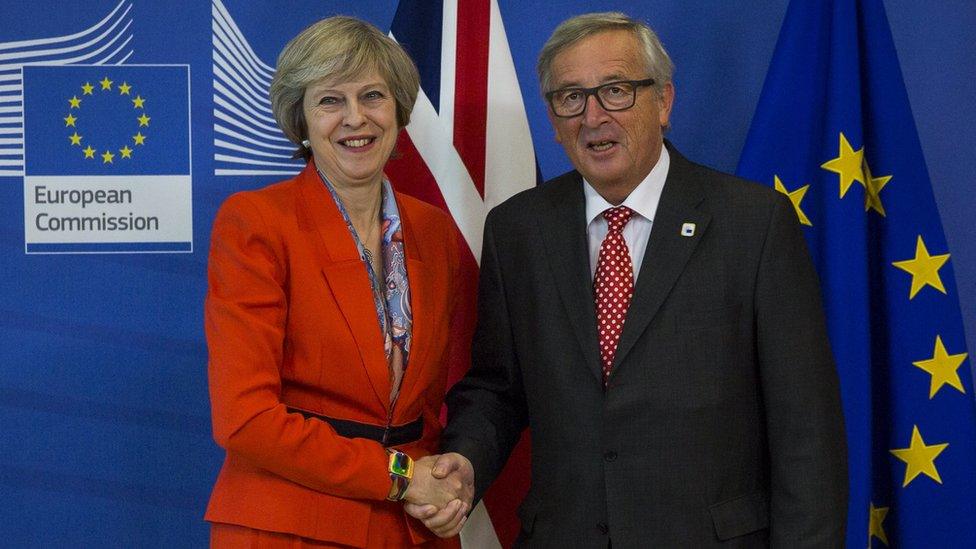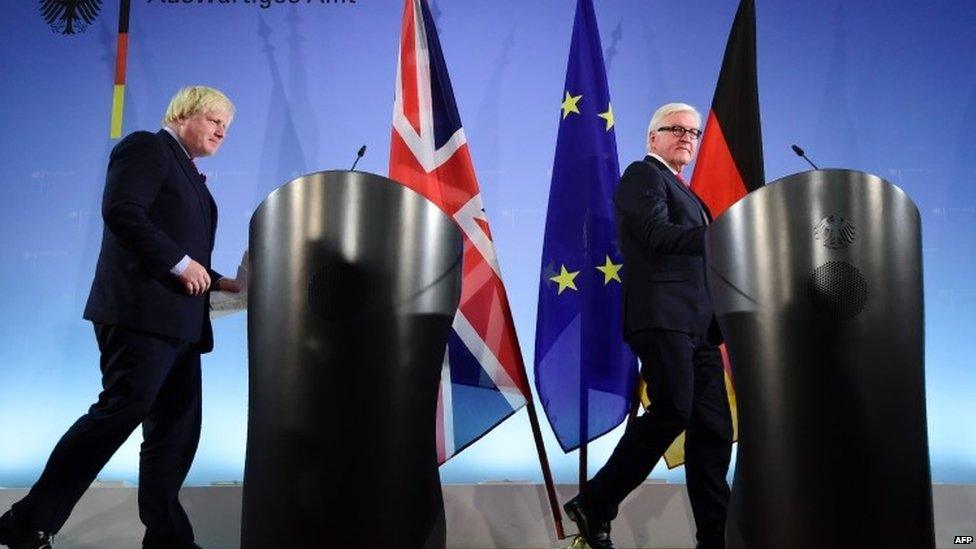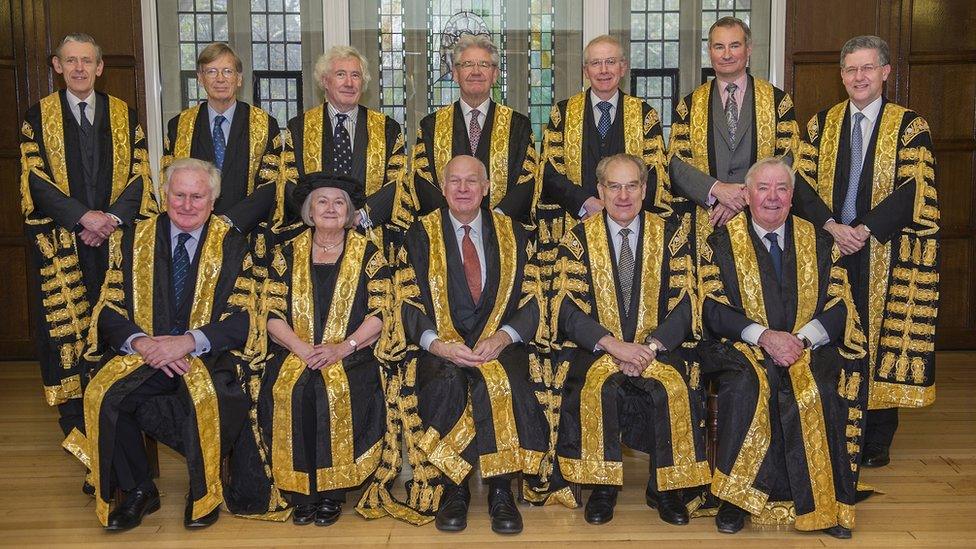Brexit: May 'confident' of winning Article 50 case appeal
- Published

Theresa May and Jean-Claude Juncker spoke by telephone
Theresa May has said she is "confident" that the government will win its appeal against a High Court ruling on triggering Brexit talks.
She told European Commission president Jean-Claude Juncker and Germany's Angela Merkel she was committed to triggering Article 50 by March 2017.
Three judges ruled that she cannot do so without Parliament's support.
It comes as a Conservative MP said he was quitting due to "irreconcilable" differences with the government.
Stephen Phillips has been among Tory MPs pushing for Parliament to be consulted over the UK's strategy for negotiating its exit from the EU, accusing ministers of trying to "ignore their views".
The government is appealing against Thursday's ruling to the Supreme Court - all 11 judges are due to hear the case in early December.
If it loses its appeal, it is expected that the government will have to publish some form of new law for MPs - and the House of Lords - to vote on.
The prime minister's spokesman said she had expressed "disappointment" at Thursday's court ruling in a phone call to Mr Juncker and Mrs Merkel but had said "the focus of the government is on the Supreme Court case. We are confident of winning that case and proceeding with Article 50".
Nick Clegg tells Radio 4's Today programme Lib Dems will look for soft Brexit
But former deputy prime minister Nick Clegg - now the Lib Dems' Europe spokesman - said his party would seek to join with others "in both the Commons and the Lords to amend the legislation" to tell the government to pursue a "soft Brexit" that would keep the UK within the EU's single market.
"If they believe the government is pursuing an unnecessarily hard, in other words an unnecessarily self-harming version of Brexit, then of course MPs should be free to reject that," he told the BBC.
Conservative peer Lady Wheatcroft told BBC Radio 4's Today she was willing to table an amendment to future legislation to delay the Brexit process, saying it was "only right to delay triggering Article 50 until we have a clearer idea of what it actually entails".
But former Conservative cabinet minister Theresa Villiers told the programme: "Frankly I think it would be a constitutional outrage if unelected Liberal Democrat peers were to stand in the way of implementing the clear result of a referendum in which 33 million people took part."
On Friday, German foreign minister Walter Steinmeier reiterated the German government's desire to see Article 50 triggered quickly at a Berlin press conference with Foreign Secretary Boris Johnson, ruling out any "preliminary discussions" before then.

Analysis by Jenny Hill, BBC Berlin correspondent

Boris Johnson has insisted the UK's Brexit timetable won't be "interfered with"
Boris Johnson's opening quip that (unlike his wife) he is not a Berliner did little to improve a rather frosty joint press conference after his first official bilateral meeting with his German counterpart Frank Walter Steinmeier.
It is Mr Johnson's first visit as foreign secretary to Berlin, where he's widely regarded - in some cases with contempt - as being directly responsible for Britain's decision to leave the EU.
This wasn't the outcome the German government hoped for. But now the decision's made they'd rather Britain just got on with it.
Mr Steinmeier - who looked unimpressed by Mr Johnson's assertion that Brexit represented an opportunity - emphasised the need for the British government to trigger Article 50 as soon as possible.
His priority, he added, was to the remaining 27 member states.

Thursday's High Court ruling found that the government could not trigger Article 50 of the Lisbon Treaty alone, without the backing of Parliament - which would require publishing legislation to be debated by the Commons and the Lords.
It was met with furious newspaper headlines, with the Daily Mail describing the judges involved as "enemies of the people" - which in turn sparked a social media backlash.
Chantal-Aimee Doerries QC, chairman of the Bar Council, told BBC News the "attack on judges" and their role was "extremely concerning": "The rule of law sits in our democracy as a cornerstone and it is important for our judiciary to rule on questions of the rule of law. If we do not respect the independent judiciary in that role we put at risk our democracy."
Labour's shadow justice secretary Richard Burgon called on Justice Secretary Liz Truss, external to speak out against the "hysterical headlines" while Conservative former attorney general Dominic Grieve told the Guardian , externalthe attacks on the judiciary were "entirely unjustified".
But UKIP leadership contender Suzanne Evans told the BBC's Daily Politics: "Judges are allowing pressure groups and campaigners to bring cases for judicial review and making rulings which would not stand up to scrutiny at the ballot box."

What happens next?

The Supreme Court justices are all expected to preside over the government's appeal against the High Court's Brexit ruling
The government's appeal is expected to be heard in early December by the full Supreme Court for the first time in its history.
The judgement may not be handed down until January.
If the appeal fails, it is thought the government will then have to bring forward legislation - which would have to be approved by both Houses of Parliament.
The bill could be subject to amendments. MPs and peers may push for more details of the government's negotiating strategy or possibly for a second referendum.
The government wants to trigger Article 50 by the end of March 2017 so any legislation would need to be approved by then if the timetable is not to be pushed back.

The government has argued that it cannot "show its hand in detail" ahead of negotiations with 27 other EU member states, despite calls from MPs to clarify her plans.
For Labour, shadow foreign secretary Emily Thornberry said that while she thought "that in the end Parliament will vote for Article 50 to be triggered" the judgement meant the government would have to give MPs "some basic terms on which they are going to negotiate Brexit".